The Bolshoi in the Dark
Rough waters for Russia’s fabled Bolshoi Theatre have prompted soul-searching among the country’s dancers, officials, and fans.
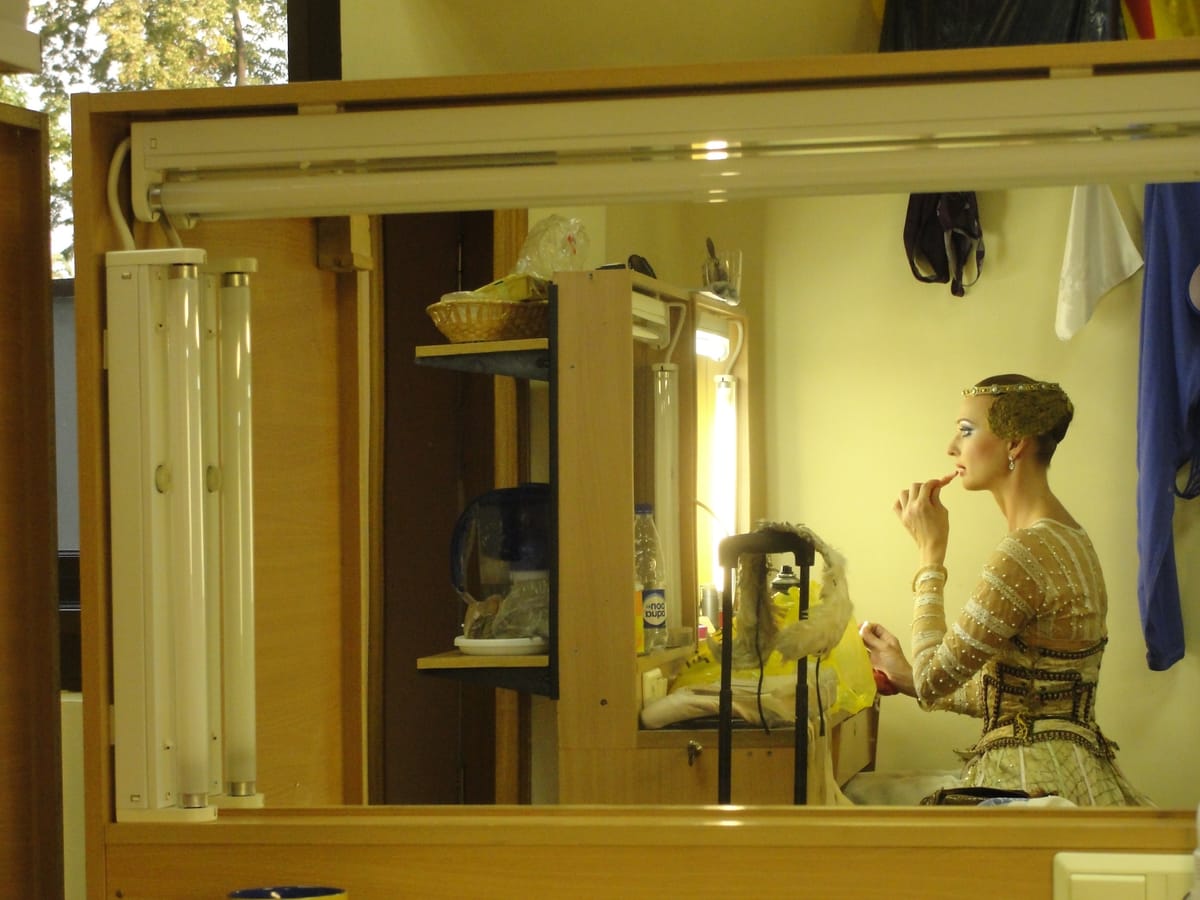
“If any girl were to come to us and ask, ‘Should I dance with the Bolshoi?’ our answer would be immediate: You dance with the Bolshoi. There is no question. There is no comparison.”
Natalya Kasatkina has been the director of the Moscow Classical Ballet since 1977, making hers perhaps the longest uninterrupted leadership of a professional dance troupe in Russian history. Her dancers come from the country’s best training schools and many have since joined the ranks of the world’s foremost companies. But in its hometown, Moscow Classical is a decidedly second-tier ballet, one without even its own stage to perform on. Simply put—it ain’t the Bolshoi.
I knew this when I contacted Kasatkina last month. I was planning to spend a week in Moscow, a trip I justified as “research” for a novel I am writing about a Russian ballerina. My timing for such a venture—mid-August, when the Bolshoi would be on tour, the staff on vacation, and the building closed to the public—was utterly perverse, but it was my only available window. I told myself there was something symbolic about scheduling a close encounter with the beleaguered Theatre at its literal and figurative darkest. I booked the ticket.
On my first day in town, I headed to the Moscow Classical Ballet, where I was welcomed warmly and invited to return, day after day. Between conversations and rehearsals, I checked my email, which was full of apologies from Bolshoi dancers just returning from tour or vacation: A grandmother’s funeral, a sudden summer cold, an unexpected film shoot—all preventing us from meeting while I was in town. I knew that the real conflict came from the Bolshoi itself—after a dozen high-profile defections and dismissals in the previous two months, even the press secretary had adopted a self-imposed gag order.
So when Kasatkina, a Bolshoi soloist from the Soviet era who will celebrate her 80th birthday next year, tells me that “there is no comparison” between her company, which has slowly established an international standing over the past three decades, and the venerable Bolshoi, which has, in one short decade, sullied its world standing in spectacular fashion—I persist in making one.
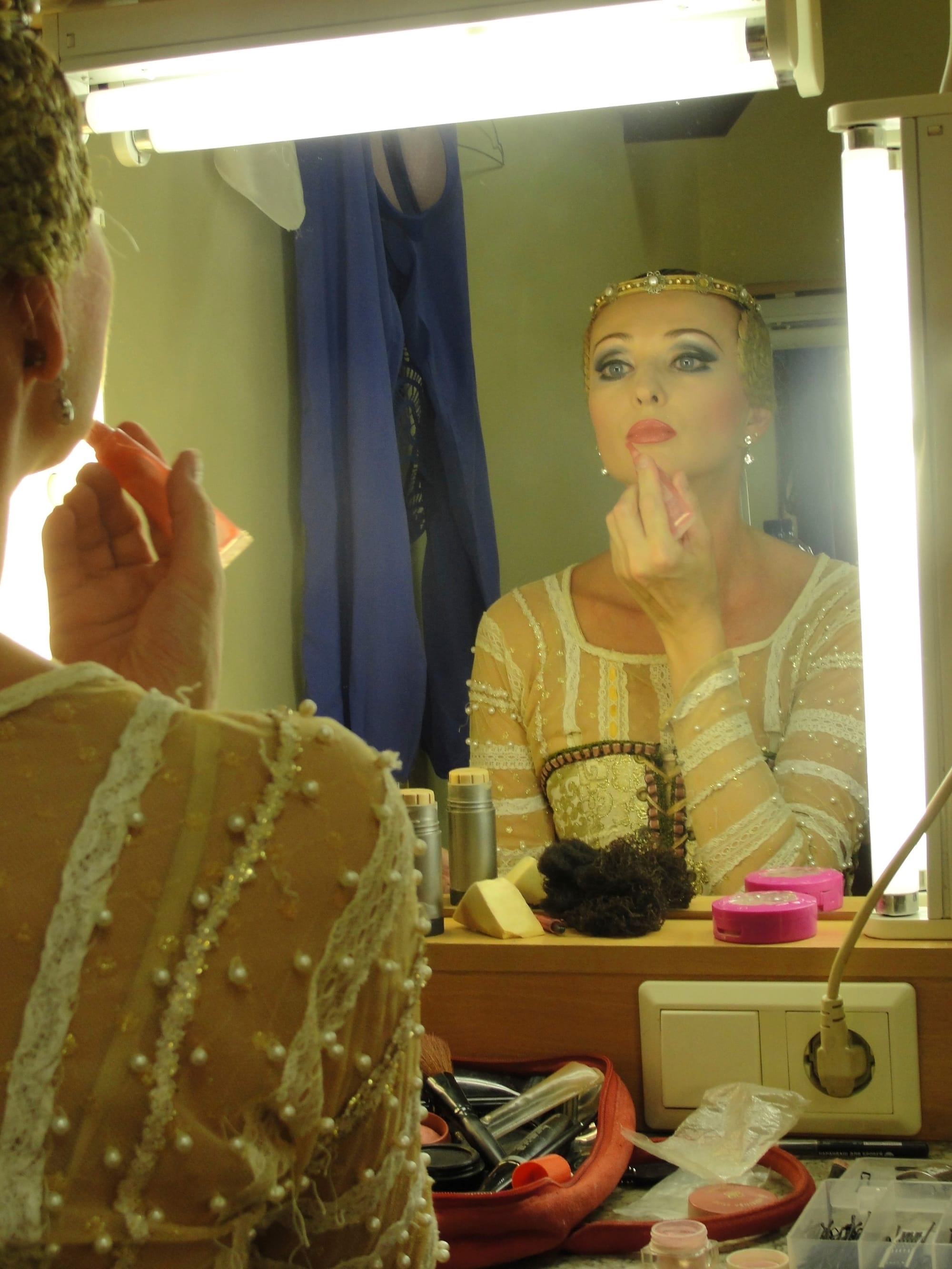
“Look, I’m a sober person. A rational person. I have no delusions. I know exactly what would have become of me if the Bolshoi Ballet had taken me.”
Marina R., who asked me not to use her last name, is what we would politely call “a mature ballerina.” She comes to work daily on a makeshift stage where she corrects partners half her age and watches girls fresh out of dance school struggle with their solos. A glamorous blonde whose 20 years on stage have earned her the silver medal of honorary titles—Merited Artist of the Russian Federation—Marina displays the regal poise that her juniors at Moscow Classical lack. Nearing 40, Marina is still a “prima ballerina,” but she will never dance the lead in Swan Lake again. She knows this. That recognition is what “sobriety” means to a professional ballerina at the end of her performing career.
So what would have become of Marina, a prima in a second-tier ballet company who has traveled the world in well-worn costumes, had she been accepted into the Bolshoi Ballet 20 years ago? The scenarios are myriad and most—quotidian and forgettable. Many involve compromise, disappointment, then retirement. But some outcomes can be described as downright nightmarish…and that is what they have been, over and over for the past 10 years, as Russia’s national treasure, the Bolshoi Theatre, has rocked from one scandal to the next.
I think of all the unnamed “girls” whom Volochkova claims are victims of a crass new Bolshoi culture. “A brothel” is what the spurned dancer, now a pop star, calls the Bolshoi.
I think of former Bolshoi stars Svetlana Lunkina, who fled to Canada, claiming her very life was at stake; Angelina Vorontsova, now in Petersburg and separated from her paramour, another Bolshoi soloist who is in prison awaiting trial for an attack on the ballet’s artistic director; Natalya Osipova, whose voluntary departure from the theater that treated her as royalty was particularly puzzling. I think of Anastasia Volochkova, dismissed rather humiliatingly for being overweight.
Mostly, I think of all the unnamed “girls” whom Volochkova claims are victims of a crass new Bolshoi culture. “A brothel” is what the spurned dancer, now a pop star, calls the Bolshoi.
But Marina R. is the first person I have heard utter the word “prostitution.”
I watch her eyes track a mismatched pair as they execute a graceless lift. The girl’s neck is strained, more taxidermied duck than dying swan; the boy trips on a gap in the peeling rubber floor and nearly drops his partner.
I wonder how much better Marina was 20 years ago than these two are now. With a sidelong glance I can imagine this strong, cynical beauty as she must have been decades ago—lithe, engaging, triumphant, perhaps. As a graduate of the Bolshoi Ballet Academy, Marina was the partner of the flamboyant Nikolai Tsiskaridze. She was not accepted into the Bolshoi after finishing at the academy, while Tsiskaridze became the Bolshoi’s most celebrated male dancer, with celebrity status, devoted fans, and patrons in high places. Until, that is, two months ago, when he exited stage right in a pyrotechnic display of acrimony and slighted pride—another self-made casualty of Bolshoi intrigue.
Marina sighs audibly at the performance before her, and I wonder whether she is absolutely certain that, had the Bolshoi accepted her 20 years ago, she would now regret it.
“When I came here, I was just hoping not to be noticed. I wanted nothing more than to dance in the corner and have no one pay me any mind.”
Polina K. was a 10-year-old child when the Soviet Union collapsed, a calamitous event she failed to notice. As far as she was concerned, the country had failed years earlier, when poverty and hunger were so pervasive that her parents sent her a thousand miles away to a prestigious ballet school hoping she would, at least, be properly fed.
That is how Polina came to be a student at the infamously tough Perm School of Ballet, which turned out star ballerinas and broken dancers in equal measure. After several years of unrelenting “torture,” Polina despaired that she was more likely on course to become one of the latter. So at age 18 she left Perm for Moscow, where she discovered Moscow Classical, Kasatkina’s company. Shortly thereafter, Kasatkina’s son discovered Polina.
She jokes about it now, years later—how she had hoped to tiptoe out of the spotlights, but instead married the director’s son, who was also the administrative head of the company. Their marriage did not last, and another difficult period followed as she weathered domestic fallout and the skepticism of her peers. In the end, Polina chose to stay with the Moscow Classical as a trainer and coach. Her brightest prospect, she tells me, is the girl I have just watched struggle through her pas de deux.
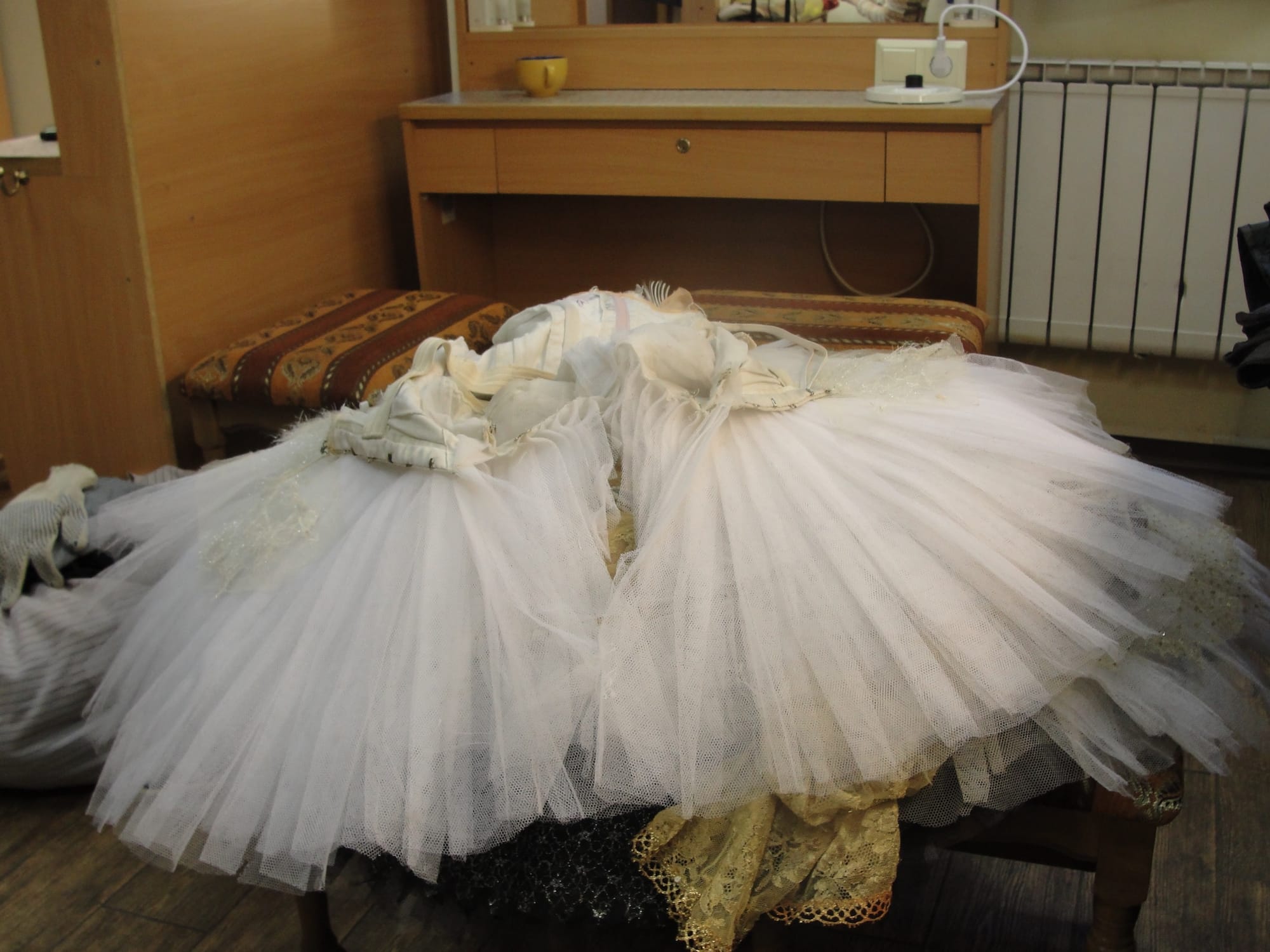
I listen to Polina’s story and study the contrasts between her and Marina. Polina’s is a soft beauty, a petite presence overshadowed by her colleague’s megawatts. She has no hard edge—only a hint of wistfulness. Some years ago, she tells me, she danced for several months with the Bolshoi while the bulk of the troupe was on an international engagement. They wanted her to join the company, she says, until they found out that she was already 34, close to retirement and too old for the corps de ballet. But the experience left her with high esteem for the younger dancers.
“Strong girls. Solid girls,” she recalls. “You don’t enter the Bolshoi without skill and hard work.”
I write this down, on the opposite side of the page from Marina’s assertion that anyone with the combination of money and influence can buy their daughter a place in the Bolshoi corps. But that once she is in, she may have to spread her skirts to stay.
“In Russia, the theater is not a workplace. In Russia, you serve the church. You serve the government. You serve the theater.”
Olga M. is an unusual Bolshoi insider. Neither an artist nor an employee, as an avid balletomane she has close ties with both and probably spends more time than either thinking about the Theatre. Culturally conservative, her solution for the Bolshoi’s rehabilitation often sounds downright reactionary: “A theater needs strong leadership. It should be a monarchy, not a federation. But that monarch must be artistic.”
It is an opinion widely shared among members of Moscow’s cultural class as well as Olga’s hundreds of Facebook followers.
Olga’s prescription is all the more intriguing when you consider that she is studying law. She is currently, she tells me, the only person in Russia studying union law as it applies to artistic professionals (except, perhaps, for the Bolshoi expellee Nikolai Tsiskaridze, who has also taken up the law, in a much-speculated-upon diversion). She hopes to help institute legislation protecting the rights of artists.
We have been communicating for several months by the time I finally meet Olga in person. She’s got more pixels than I’m used to, and she’s lost the idiosyncratic pipe that accompanied all our Skype conversations, but I recognize the jet-black hair and spunky glasses that belie the fact that Olga first attended the Bolshoi when Leonid Brezhnev was still in power.
To Olga’s mind, Pavel Dmitrichenko is in jail because he defended the honor of the Bolshoi Ballet against a tyrannical artistic director, a disinterested general director.
Ensconced in one of Moscow’s ubiquitous coffee houses and armed with her iPad, Olga launches into an update: Days ago, Sergei Filin, the artistic director who has been convalescing in Germany since he was attacked at the beginning of the year with sulfuric acid, joined the company for a final bow at London’s Covent Garden, proving that both the injuries sustained from the January attack and Filin’s professed humility are greatly exaggerated; Vladimir Urin, the man tapped to replace the recently ousted general director, has met with Filin and laid out his options for return; Pavel Dmitrichenko, the soloist charged with masterminding the attack on Filin, has dumped his lawyer (of Pussy Riot fame) for a new one, a no-nonsense guy clearly from the KGB school of justice. This, she figures, is a good sign for Dmitrichenko, who his defenders (including 300 Bolshoi employees who signed a letter to the Kremlin) believe is the fall guy in devilish plot, perhaps laid out by Filin himself.
To all of my questions she pulls up a citation, a Facebook profile, or a quote. “I’ll send it to you,” she says. And she does. The next day I will have a hell of a time matching her references with my own notes.
To Olga’s mind, Pavel Dmitrichenko is in jail because he defended the honor of the Bolshoi Ballet against a tyrannical artistic director, a disinterested general director, and all the forces that demean the Theatre’s integrity. He defended elderly Bolshoi employees insulted by new administrators. He defended his wife, Angelina, who was either capriciously or vindictively denied roles. He defended the young women in the corps, who, yes, maintains Olga, are pimped out as escorts to big donors and trustees with regularity.
“Does that mean that he really did order the attack?” I ask.
“It means he is emotional,” she says.
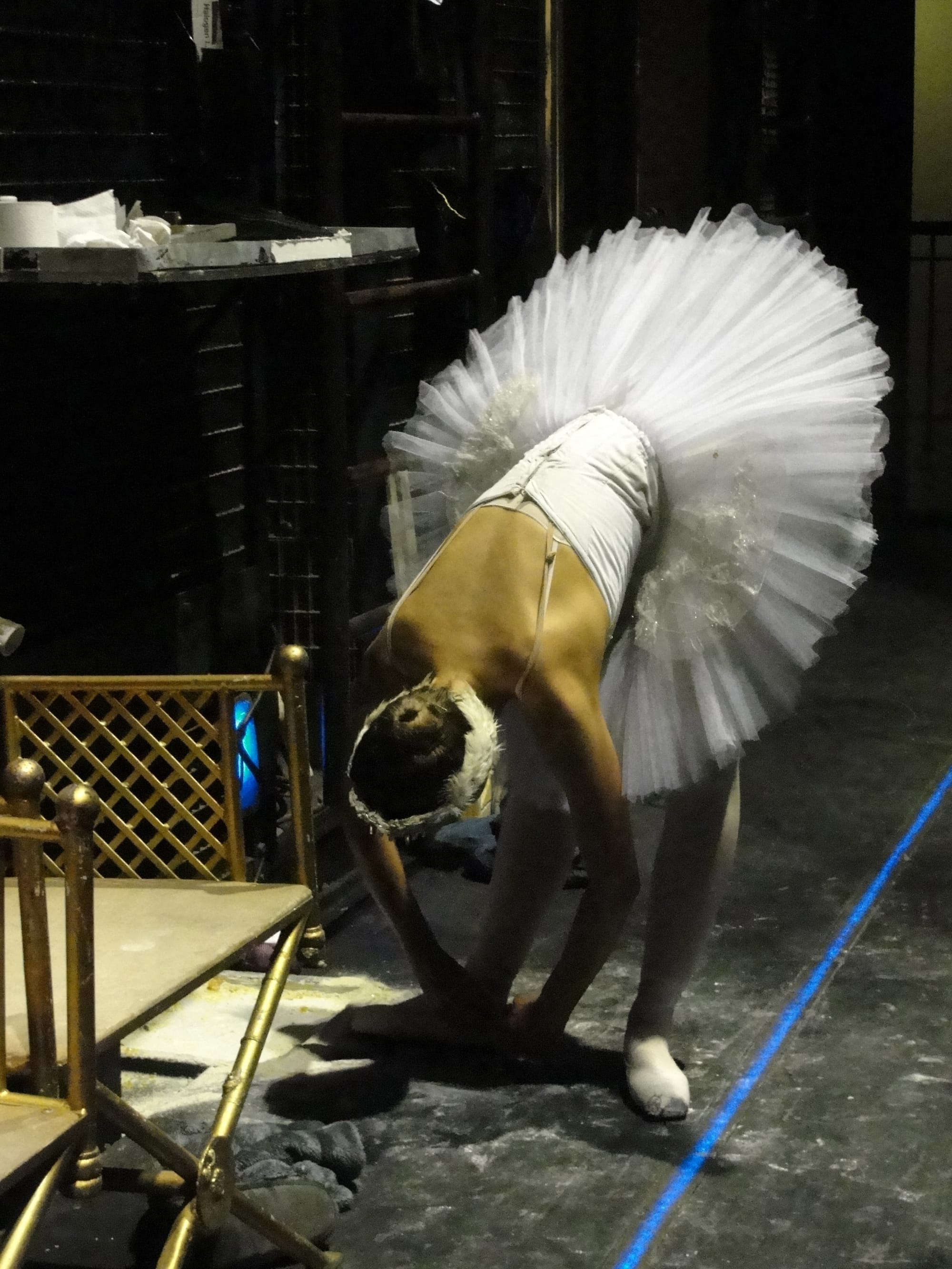
“It all reminds me of The Truman Show. Whoever is running it is an excellent actor.”
A few days later, a journalist acquaintance shares with me a letter she has received from Pavel Dmitrichenko.
“I can’t give details about this affair, as it presents great danger for me and my family,” writes Pavel from his prison cell. “But if you analyze all the information, you will understand who benefits from it all.”
The 21st-century Bolshoi has been taken hostage by criminal intent, excessive profits, public disinterest, and limitless ambition.
Logically speaking, there is no scenario that adequately explains who benefits from the attack on Sergei Filin. None of the players implicated has emerged unscathed, including the now-departed general director, Anatoly Iksanov, who was discharged after 13 years in the job when yet another high-powered ballerina was slighted and allegedly took her case directly to Vladimir Putin. Even if there is a hidden win in the outcome—one that only a sleuth as dogged as my journalist acquaintance might unravel—it is unlikely that it conceals a bigger gain than, say, the embezzled funds from the Bolshoi’s massive six-year reconstruction project that went 16 times over budget. Or the estimated $30 million dollar business in black-market ticketing at the Bolshoi.
Without an obvious scenario adequately matching motivation and outcome, the simplest explanation for the drama is a harsh, but non-specific condemnation: The 21st-century Bolshoi has been taken hostage by criminal intent, excessive profits, public disinterest, and limitless ambition.
“A culture of criminality.” “Performance as profit.” “Gymnastics on pointe amid crass commercialism.” These are common dismissals. More dramatically: “Unclean forces” have possessed “our national pride,” leaving “the temple rocked and our faith shaken.”
The Bolshoi leadership just wants the story to go away. It’s a bigger story in the press than in the Theatre itself, say managers and spin doctors.
Dmitrichenko, who has recanted his earlier confession in the attack on Filin, will almost certainly be convicted. The hundreds of Bolshoi artists and employees who months ago signed a letter in his defense are unlikely to attend his trial in October. Some of them have already seen their contracts terminated. As for the others—well, the new season is beginning; rehearsals are scheduled; roles are in the balance.
Even Dmitrichenko’s wife, the ingénue Angelina Vorontsova, has fled Moscow “after multiple threats from the ballet’s leadership,” he writes. She dances now with the Mikhailovsky Theater in St. Petersburg; she is “under the protection,” writes Dmitrichenko, of director Vladimir Kekhman—a fruit-export tycoon currently under investigation for fraud. Vorontsova, at least, has been largely spared the invective that was heaped on Natalya Osipova, when she turned her back on the Bolshoi in 2011 for the lesser-known theater of “the banana king.”
“The troupe is in the best shape it has been in for 40 years. Iksanov’s 13 years were an outstanding reign.”
As head of the Executive Committee of the Bolshoi Theatre Board of Trustees, Alexander Budberg cannot be expected to be objective. But when he tells me that, acid attacks and star defections aside, the Bolshoi is in better health now than it was four decades ago, I raise my eyebrows.
He lays out his evidence: the physical soundness of the historic building after a massive reconstruction and a modernized, energized repertoire. In these two claims, Budberg is absolutely correct.
It’s not every wealthy supporter who is willing to spend a precious half-hour with the president of Russia on the question of raising salaries for tenors and ballerinas.
Early this century, the historic building on Theatre Square was on the point of physical collapse. Its repertoire in stasis. Then came a decade of petro wealth and artistic experimentation. Shrill detractors hyperventilate over “pornographic” choreography and “debased” librettos. Other skeptics see graft in the gilded new décor (which, being Russian and new, flirts with garishness). Put simply, the Bolshoi is steadily producing 21st-century productions on an opulent neo-Imperial stage. Even if not everyone likes it.
Neither of these essential modernizations, says Budberg, could have been realized without the Bolshoi Board of Trustees, a lobbying force that supplements the Theatre’s $120 million annual budget with a second, equally valuable, currency—access to the highest levels of power in the Kremlin. “You need people,” notes Budberg, “who are willing to go to the ministers and to executive, decision-making individuals and say, ‘Look, the thing is already taken care of. Just sign it and it’s done.’” It’s not every wealthy supporter, he adds, who is willing to spend a precious half-hour with the president of Russia on the question of raising salaries for tenors and ballerinas. But he did.
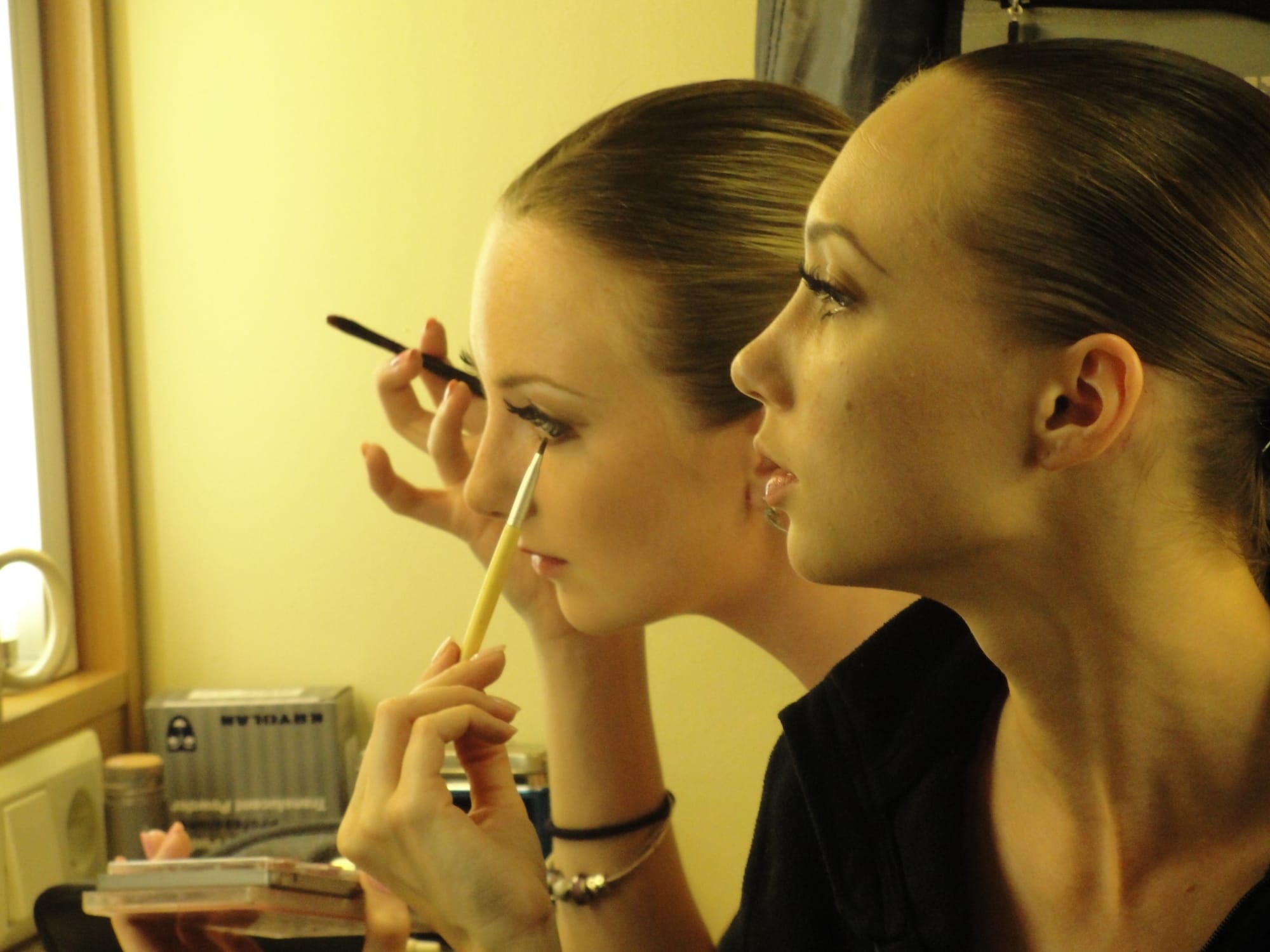
And what about accusations that such influence works against the artists of the Bolshoi? That influence can be abused for personal gain and pleasure?
Budberg nods at this familiar screed—he knows there are “banana kings” to reckon with, wealthy dilettantes with questionable integrity. Iksanov, he notes, was right to worry that the trustees might become “too interested in the Theatre.” But on this he is unequivocal: The Bolshoi Board of Trustees, he insists, has no creative say whatsoever. They don’t decide who dances or what is performed or how much anyone is paid.
He takes a swallow from his teacup as a period. They can, he adds, help pay the mortgage on an apartment in the center of town for a diva who might be looking at world-class invitations.
“Is that an acceptable expenditure for the board of trustees?” I ask.
“Acceptable,” he answers, “if not the best use of funds.”
“The Bolshoi are in these dark times. They need someone who is full of light.”
Joy Womack, just 19 years old, is the first American female dancer on contract with the Bolshoi Ballet. Recruited at a New York summer intensive, she completed three years at the Bolshoi Academy’s rigorous training program before being offered a position in the Ballet a year ago. But there was a catch.
“They told me I wouldn’t get in if I wasn’t married.”
Joy tells me this by phone from her parents’ home in Austin. As luck would have it, she is returning to Moscow just as I am leaving. I haven’t managed to speak to a single Russian Bolshoi ballerina during my trip; I have consoled myself with the knowledge that they would have been guarded, unrevealing conversations at best.
But now this American girl is telling me that after a year in a sham marriage, she is filing for divorce.
“There are a lot of girls who look up to me,” she says, her voice fuzzy on the international line. “I would be ashamed if I didn’t show that you don’t have to compromise to be what you want to be. I just want to be a ballerina.”
Joy has not yet informed the Bolshoi of her intent. She knows that it will disrupt her application for Russian citizenship, and maybe even her work visa. She wants very much to stay with the Bolshoi, which she says has been her dream for as long as she can remember. But if they insist that, to prove intent of citizenship, she cannot be single, “that’s a deal-breaker.”
Having shared this predicament (“I’m still nervous about talking about it”), Joy tells me she wants to be a good spokesperson for the ballet. For a long time, Joy sings the praises of this revered institution, its dedication to high culture and close mentorship from generation to generation. She tells me how much she loves her teachers, and in particular Boris Akimov, who led the ballet briefly before the string of disastrous appointments ending with Filin’s. Akimov is maybe that “man full of light, “she says.
But I am only half listening. I’m thinking of all the dancers who whose departures from the Bolshoi have already echoed (or will soon) more loudly than this young foreign soloist’s. I’m thinking of Marina, and her “sober” assessment of the horrors of the Bolshoi. Marina was Joy’s age when she graduated from the Bolshoi Academy only to find her progress blocked because she lacked the connections, money, or influence known collectively as “blat.” In such cases, she had told, me girls have to find other resources: “Your only hope, in the ballet today, is to make a good marriage.”
Two days later, I call Joy again. Now she is in Moscow and I am in America but her voice is clearer, more certain than it was before. “I’m the first one back from vacation,” she laughs. “It’s cold and rainy and there’s not a soul back in town yet.” She tells me she has a meeting with the head of the Theatre in a few days time, which will decide her future.
I ask if all Russian ballets have such stringent conditions for foreigners. She’s invested so much in Russia, learned the language, made friends, begun the citizenship process. Maybe she could go to the Mariinsky? The Mikhailovsky? If the Bolshoi turns her down?
But Joy says that’s not the point. “I’m Bolshoi through and through.”
I wish Joy well and ask her to keep me posted. It’s hard to say where she will be dancing in a year’s time, but while it may not the Bolshoi, it almost certainly will not be the Moscow Classical Ballet. For better or worse, there really is no comparison.
